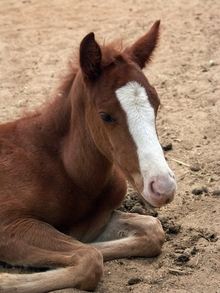Updated Infectious Disease Control Guidelines, including newly created guidelines for Rhodoccocus equi, have been published by the American Association of Equine Practitioners and are available on the AAEP’s website.

A foal at rest
Rhodococcus equi has been added to the infectious disease guidelines because it is a significant disease of growing foals despite considerable research into its treatment and prevention.
Most of the changes to established guidelines pertain to updated sampling and control measures. The AAEP’s Infectious Disease Committee also amended suspected case guidelines for respiratory, neurologic and clostridial diarrhea to outline appropriate actions and steps for suspected cases; and several resource documents for sampling and equine herpesvirus.
Rhodococcus equi has been added to the existing list of available infectious disease guidelines. According to Dr. Peter Morresey, 2017 chair of the Disease Guidelines Subcommittee, “Rhodococcus equi remains a significant disease of growing foals despite considerable research into its treatment and prevention.
These new guidelines incorporate current thinking and a systematic approach balancing diagnostics, therapeutics and economics.”
All of the guidelines have been reformatted for improved consistency and navigation. The guidelines documents are now available as PDFs, enabling practitioners to save the guidelines to their portable devices for access offline in the field.
They also contain links to other resources on all disease conditions for those wanting additional reference material.
Visit https://aaep.org/guidelines/infectious-disease-control/using-guidelines to view the new and updated guidelines or to save them to your phone or tablet for future reference.
The American Association of Equine Practitioners, headquartered in Lexington, Ky., was founded in 1954 as a non-profit organization dedicated to the health and welfare of the horse.
Currently, AAEP reaches more than 5 million horse owners through its over 9,000 members worldwide and is actively involved in ethics issues, practice management, research and continuing education in the equine veterinary profession and horse industry.
